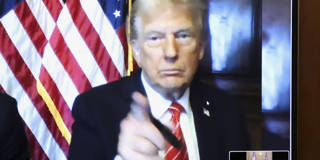OnPoint Subscriber Exclusive
The Big Picture brings together a range of PS commentaries to give readers a comprehensive understanding of topics in the news – and the deeper issues driving the news. The Big Question features concise contributor analysis and predictions on timely topics.

Can US Institutions Withstand Trump 2.0?
From threats to pursue his “enemies” to an apparent commitment to cementing plutocracy in America, Donald Trump’s second term will again test the resilience of the US constitutional order. And this time, he has not only full control of Congress, but also a Supreme Court ruling guaranteeing his immunity from criminal prosecution for official acts while in office.
On the eve of Trump’s inauguration, we asked Daron Acemoglu, Bruce Ackerman, Aziz Huq, Alison L. LaCroix, and Richard K. Sherwin whether there are any institutional checks that can restrain his worst impulses – and if they can survive the next four years.